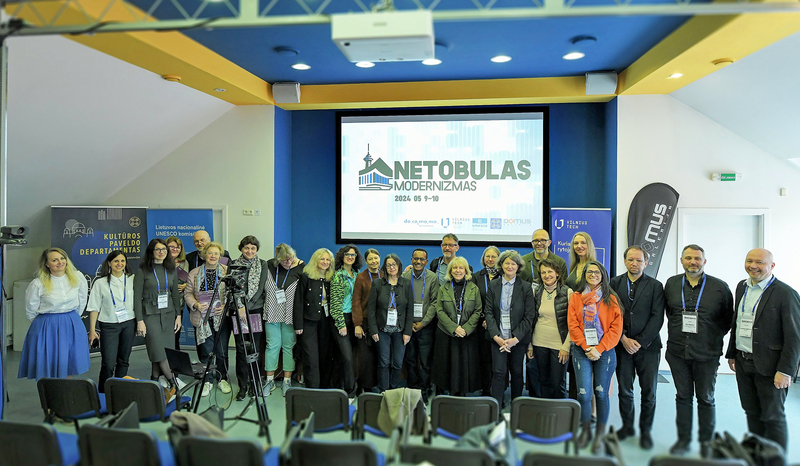Home
For international students
Is it Possible to Adapt 20th century Architecture to the Needs of Today and the Future?
- Programmes in English 2025/2026
- Admission 2025/2026 Scholarships
- For exchange students
- Free Movers
- Transfer studies
- Erasmus+ studies and traineeships
- Mentor programme
- Student testimonials
- Accommodation
- Career Services
- Medical Care
- Immigration Regulations
- Leisure and Student Activities
- Useful information
- VILNIUS TECH for Creators of Tomorrow
- Mental and spiritual support
- Representatives Abroad
- Contacts
- Computer Engineering

2024-05-14
Is it Possible to Adapt 20th century Architecture to the Needs of Today and the Future?
Research on 20th century architecture in Lithuania is taking on new colours - the International Scientific Conference "Imperfect Modernism" was held at the Faculty of Architecture of Vilnius Gediminas Technical University (VILNIUS TECH) on May 9-10.
"Imperfect" created a space for a liberal discussion, which is necessary to build professional bridges between people from different cultural, geographical and economic contexts, and to invite everyone to openly question and seek answers: what to do with the architecture of the twentieth century?", - the idea of the conference was presented by the Dean of the Faculty of Architecture, Assoc. Prof. Liutauras Nekrošius.
The conference was attended by scholars from Eritrea, Israel, Kosovo, Poland, Lebanon, Lithuania, Canada, Portugal, Sakartvelo, Ukraine and Germany. The meeting lasted for more than two days, and the foreign guests had the opportunity to visit significant modernist sites in Lithuania: the interwar architecture of Kaunas (inscribed on the UNESCO World Heritage List in 2023), the Ignalina Nuclear Power Plant and the town of Visaginas, the Lithuanian National Opera and Ballet Theatre, the ISM University (the former central post office in Vilnius), and the Vilnius TV Tower.
"We have many variants of modernism around the world. Modernism takes different forms in each country. An important segment of the conference was devoted to Ukrainian modernist architecture, the future of whose heritage is uncertain due to the current situation," shared one of the moderators of the conference, VILNIUS TECH Professor Almantas Liudas Samalavičius.
The conference also focused on DOCOMOMO International, where representatives from different countries presented papers on the organisation's work to address the challenges of 20th century architecture."DOCOMOMO is an international voluntary public organisation that has been developing its activities for more than 30 years. It is dedicated to the advocacy, documentation, preservation and various processes related to 20th century architecture. DOCOMOMO unites territorial national units, but there is no such thing in Lithuania yet", said the Dean of the Faculty of Architecture of VILNIUS TECH.
"Post-Soviet countries have a huge heritage of modernism. But what is important for society today is sustainability and resilience: is it possible to adapt 20th-century architecture to the needs of today and the future?" - Prof. Dr. A. L. Samalavičius summed up the conference's issues.
The theme of modernism will be continued next year in the conference "Madame Architect" organised by the Faculty of Architecture of VILNIUS TECH. "Public architecture is thousands of years old in the world, and women in architectural practice only appeared in Lithuania after the war. More women than men are graduating from architecture now, but they leave the profession later. What are the reasons for this? A lot of attention will be paid to presenting research on the creative legacy of women architects in different countries in the 20th century," announced Associate Professor Dr. Liutauras Nekrošius.
The conference "Imperfect Modernism" was organised by the Faculty of Architecture of VILNIUS TECH. International partner of the conference: DOCOMOMO International. Sponsors: Lithuanian National Commission for UNESCO, Department of Cultural Heritage under the Ministry of Culture of the Republic of Lithuania, Domus Gallery. More information and the conference abstracts can be found here.
For more highlights of the event, click here.
Article prepared by Agnė Vėtė, Vice Dean of Communication, Infrastructure, Alumni and Partnerships, Faculty of Architecture, VILNIUS TECH
Photo: Aleksas Jauniaus












